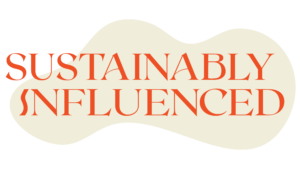Why Are Sustainable Beauty Products More Expensive?
As an eco-conscious person, you might have decided to take a look at your beauty routine and switch your existing beauty products to more sustainable ones, only to discover that they are more expensive.
A recent study by Statista showed that 54% of UK consumers are willing to pay more for eco-friendly products, even though the cost is often higher. Plus 81% of consumers prefer eco-friendly packaging.
So why should you pick a plastic-free shampoo bar at £10 instead of the £2 supermarket shampoo? Why is there such a big difference in pricing for sustainable beauty brands?
“Conventionally, businesses operate on only one bottom line, and that is price. When it comes to brands making efforts to be more sustainable, they’re usually thinking of more than just cost,” says Ericka Rodriguez, founder of Axiology.
Tiffany Buzzatto, the founder of DEW MIGHTY, decided to handle all production in-house, “We decided to build a company from the ground up so unlike many others we handle our design, logistics, supply chain, and R&D all in-house. This makes it magnitudes more controllable for plastic-free requirements to our suppliers and pricing transparency.”
There are various factors behind the pricing of sustainable beauty products:
Raw materials
Adding cheaper, ‘filler’ materials is the easiest way to keep the cost of a product down. That doesn’t mean that affordable products are necessarily subpar, though most are certainly not sustainable.
The packaging of a product can easily drive costs up, there is a big difference in price between post-consumer-recycled plastic (PCR plastic) and virgin plastic, “in most cases, the latter is the cheapest option you can find, which is why you see it everywhere. Other materials, like glass, can be more expensive to ship because it’s heavy, or more costly to dress up to compete with ‘conventional’ products, like paperboard,” says Rodriguez.
Buying raw materials from within your country of production (the US in this case) is often more expensive than sourcing them from elsewhere, explains Rodriguez, but local sourcing lowers the brand’s carbon footprint overall.
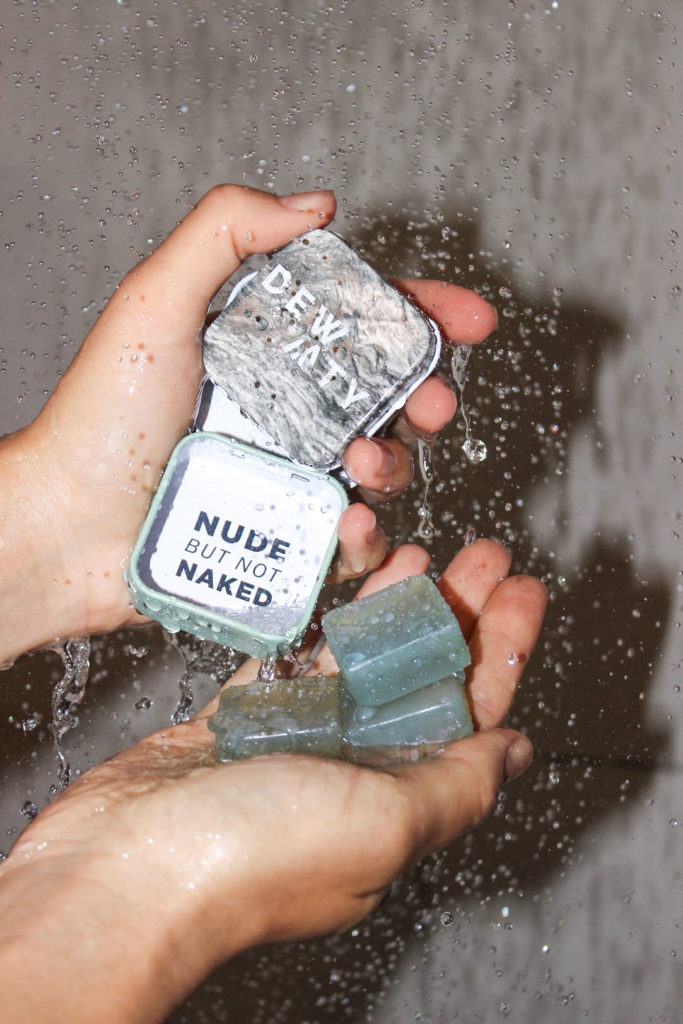

Images courtesy of Dew Mighty
Ethical production
Sustainability goes hand-in-hand with ethics and the sourcing of raw materials can be a slippery slope, as it’s often very exploitative Rodriguez says; “brands need to look at where their ingredients are coming from to make sure that the people doing the work are being paid fairly, that working conditions are safe, and that the production of that raw material is sustainable.”
“It is easy for products to appear less expensive if they are made in a different country with unfair wages, utilize dangerous manufacturing practices, and use less quality materials like plastic or fillers, but hey – out of sight out of mind right?” says Buzzatto.
Looking at the production from an ethical perspective isn’t the norm and “making sure a brand adheres to these standards is going to be more expensive than the cheapest option available,” explains Rodriguez.
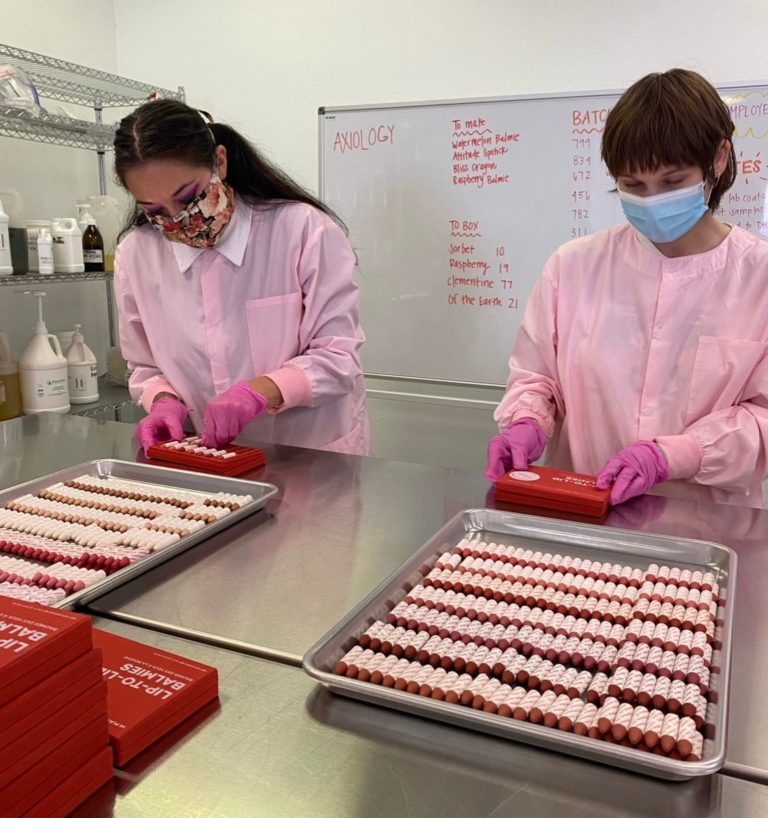
Image courtesy of Axiology
Plastic-free
Many sustainable beauty brands –like Axiology and DEW MIGHTY– are eliminating (or minimising) plastic within their products.
“With talk of PFAS [substances used in coatings of items for heat-resistance and more] mostly their role in the environment as being toxic ‘forever chemicals’ we want to help everyone understand there is a level above clean beauty that needs to be achieved. DEW MIGHTY considers the environmental impact of our beauty products in total (company, package, and ingredients) not just the raw materials used,” says Buzzatto.
More sustainable, plastic-free packaging can be particularly tricky for beauty brands as due to the creamy formulas, packaging can’t always be reused. So sustainable brands can spend years (and a lot of money) researching and selecting the best solution.
It’s worth mentioning that both Axiology and DEW MIGHTY are plastic-free with biodegradable or reusable packaging. Axiology has ditched plastic lipstick tubes completely and instead uses a paper wrapper, while DEW MIGHTY has created the first-ever solid serum that comes in a reusable metal tin.
This isn’t an easy feat Buzzatto explains, it’s like a puzzle, “even our mailer boxes eliminate as much dead space but create a compact protective way to ship to customers. It was all thoughtfully created to eliminate the use of plastic and waste”.
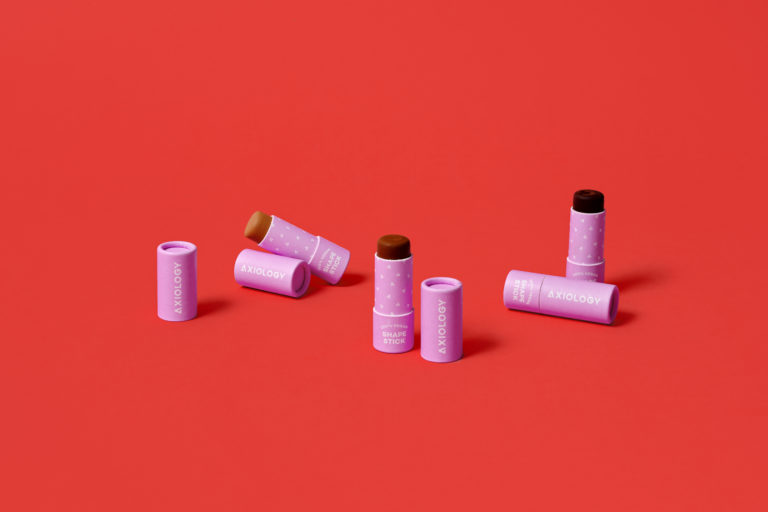
Image courtesy of Axiology
Minimum order numbers
More often than not, the more groundbreaking brands are small businesses that can’t yet afford to keep costs down when they first launch. This is due to a variety of reasons (including the materials and ingredients), as well as the minimum quantities required.
“There are huge cost savings associated with buying or producing ‘at scale’” Rodriguez says. “The jump between being a small startup and what constitutes a normal minimum order quantity is huge and it can be very challenging to manage that in-between space.”
What can we do as consumers?
It’s important to look at the whole image and at the end of the day, no one is a perfectly sustainable consumer. But mindfulness when making our shopping decisions is a step in the right direction.
Buy less, but better is my personal view when it comes to fashion, beauty and even homeware and the founders I spoke to share these feelings.
“It can be difficult to break the habit of buying and trying more, but, in my personal opinion, I think choosing one slightly more expensive, but also more satisfying, thing is worth it,” says Rodriguez.
“Here at DEW MIGHTY, we talk about buying fewer but better and creating quality products that not only provide high-performance results but are also built to last when refilled. I would consider the number of uses, the length of time a product lasts, does it actually fulfil a need, and the practices of the company when purchasing a product versus the simple number of a price tag,” says Buzzatto.
Share This Story
Related Posts

Paris City Guide: Where to Eat, Drink, Stay and Wander Like a Local
Paris City Guide: Where to Eat, Drink, Stay and Wander Like a Local Avalon Afriyie Heading to Paris this winter? As a resident who has

The Sustainably Influenced Gift Guide 2025: 36 Chic Buys for Every Giftee
The Sustainably Influenced Gift Guide 2025: 36 Chic Buys for Every Giftee SI’s Holiday Gift Guide has arrived—curated by our editors and filled with picks
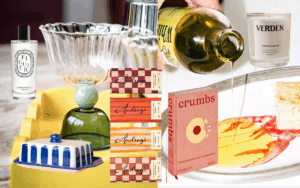
What to Bring to a Dinner Party: 15 Chic Gifts That Go Beyond Flowers
What to Bring to a Dinner Party: 15 Chic Gifts That Go Beyond Flowers Rosa Morell Intimate small-plates soirées or lavish three-course affairs–every dinner party

Soft Goat Is The Brand On Everyone’s Wishlist – Here Are The 12 Pieces We Cannot Get Enough Of
Soft Goat Is The Brand On Everyone’s Wishlist – Here Are The 12 Pieces We Cannot Get Enough Of AW25 fashion is about to get
